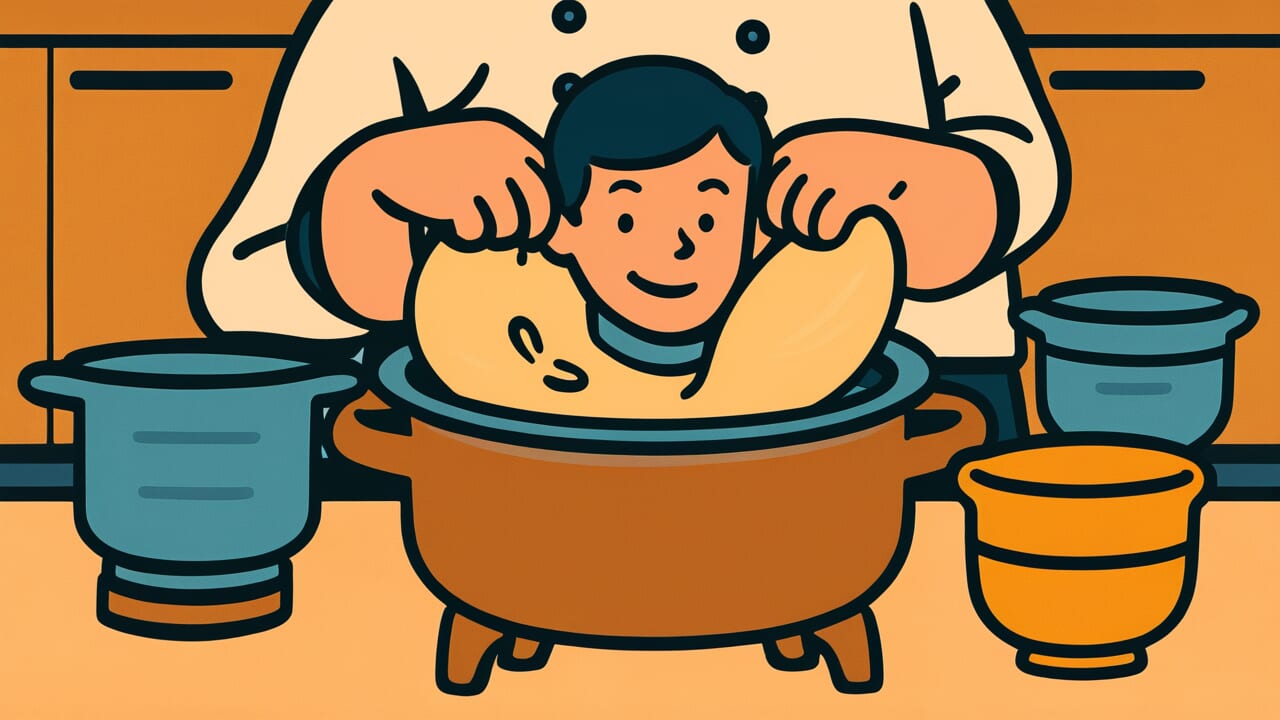How to Read “Even scraping the bottom of a large pot yields three bowls”
Ōnabe no soko wa nadete mo sanbai
Meaning of “Even scraping the bottom of a large pot yields three bowls”
“Even scraping the bottom of a large pot yields three bowls” means that no matter how large or impressive something appears, the actual benefits you can gain from it are limited.
The core of this teaching lies in the contrast between the abundance suggested by a large pot and the mere three bowls you can collect by scraping its bottom.
This proverb warns against having excessive expectations based on outward splendor or large scale. A big organization, an impressive title, luxurious facilities—these may look wonderful, but what you actually gain from them may not be as much as you think.
It also applies to situations where someone has great assets or wealth, yet what they can actually use or enjoy remains limited.
Today, this saying teaches the importance of not judging by scale or appearance alone. Instead, we should calmly assess the real value and actual benefits something offers us.
Origin and Etymology
Unfortunately, no definitive record has been found regarding the exact literary origin of this proverb. However, we can infer its development from the structure of the phrase itself.
A large pot refers to the big cooking vessels once used in Japanese homes and communities. These were used to prepare massive amounts of food for large families or village events.
Their size was far greater than what we imagine today. After serving the food, a small amount would always stick to the bottom of the pot.
Even when you scraped this residue with a ladle, you could only collect about three bowls. This observation likely gave birth to the expression.
What makes this phrase interesting is how it contrasts “large pot”—emphasizing size—with “three bowls,” a specific small quantity.
It reflects the practical observation skills of Japanese people: don’t be fooled by impressive appearance or large scale, because what you actually get is limited.
The saying probably crystallized from actual experiences at communal work or festivals. It embodies the wisdom of ancestors who understood that the bigger something looks, the more carefully you need to assess its reality.
Usage Examples
- That company has thousands of employees, but even scraping the bottom of a large pot yields three bowls—the starting salary is lower than expected
- My parents’ inheritance looked substantial, but even scraping the bottom of a large pot yields three bowls—after paying inheritance tax, very little remained
Universal Wisdom
“Even scraping the bottom of a large pot yields three bowls” speaks to a universal human psychology: our illusion about bigness.
We instinctively feel attracted to large things, impressive things, luxurious things. We expect that what we gain from them will also be large. But reality doesn’t work that way—scale and actual benefit don’t always match.
This teaching has been passed down through generations because humans in every era are easily fooled by “apparent size.”
We assume that joining a big corporation guarantees security. We believe that a famous title will bring happiness. We envy others’ luxurious lifestyles.
But when we actually reach that position, we discover the benefits aren’t as great as we thought.
Our ancestors saw through this human tendency with sharp insight. They used the concrete image of a large pot to help us regain our calm judgment.
Perhaps a small workplace where you have autonomy yields more fruit than becoming a cog in a huge organization. Perhaps real authority and freedom matter more than an impressive title.
This proverb continues to teach us the importance of developing eyes that can see such essential truths.
When AI Hears This
When viewed thermodynamically, the act of scraping the bottom of a pot reveals a surprising fact.
The small energy applied to one localized point—the pot’s bottom—inevitably dissipates as it spreads through the entire large system of the pot.
According to the second law of thermodynamics, energy always moves from high to low, from ordered to disordered states.
The tiny kinetic energy generated by scraping spreads throughout the metal pot and eventually escapes into the surrounding air.
This dissipation rate is proportional to surface area, so larger pots become less efficient. Mathematically, when a pot’s volume doubles, its surface area increases by about 1.6 times, causing energy loss to rise sharply.
Even more interesting is the specific number: three bowls. This is an empirical value, but it actually suggests a critical point.
In physics, when a system’s size exceeds a certain threshold, a phase transition occurs where local actions can no longer affect the whole. The large pot has exceeded precisely that threshold.
In other words, this proverb teaches us, as a fundamental law of the universe, why small efforts cannot change large systems.
The ratio between the scale of effort and the scale of the system decisively determines the outcome. This is a cold, hard truth.
Lessons for Today
This proverb teaches modern people the importance of developing eyes that can see the essence of things.
People showing off luxurious lives on social media, friends working at major corporations, acquaintances with impressive titles—when you feel overwhelmed by such outward glamour, remember these words.
This teaching also applies to your own life choices. When choosing where to work, are you deciding based only on company size or name recognition?
When thinking about marriage, are you only looking at the “large pot” of family background or income? The happiness and fulfillment you feel daily might come from somewhere completely different.
What matters is identifying what constitutes “three bowls” for you personally. A small company that gives you autonomy and growth opportunities has great value for you.
A modest but heartfelt relationship brings a richer life than anything else. Look at inner substance, not outer size.
This proverb gently teaches us such a wise way of living.



Comments